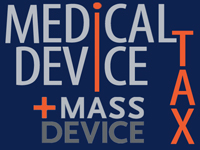Medical device companies ponied up $1.4 billion in excise tax payments to the federal government in 2013 to pay for Obamacare, according to documents supplied to MassDevice.com by the Internal Revenue Service.
The $1.4 billion in levies paid by medtech companies to the feds last year came during the 1st year of implementation of the 2.3% medical device excise tax, created in 2009 to help pay for the Affordable Care Act. The IRS supplied the total payments made last year in response to a Freedom of Information Act request filed by us on May 14 through our partner Muckrock.com.
Estimates of the impact of the medical device tax have varied wildly since its inception in 2009, and 4 years of political deadlock, which included a federal government shutdown over the issue, have done little to add clarity to the issue. Federal government officials have projected that the tax will raise about $30 billion over 10 years.
Back in July 2013 a report released by a coalition of medical device lobbying groups estimated that the tax had cost the industry $1 billion in bi-monthly installments of roughly $97 million. In March 2012, Moody’s Investor Services said the tax costs could top $650 million for just the medtech companies it covers.
In March this year, MassDevice.com analyzed federal securities and exchange commission documents for 150 public medical device companies. Many firms did not list the dollar amount paid out for the tax (or even mention it, or the Affordable Care Act) and a few, such as diabetes device maker Dexcom (NSDQ:DXCM), said their products were exempt. Others, including Zimmer (NYSE:ZMH), said they were carrying the tax as a cost of inventory until the inventory was sold. IRS rules covering "constructive sales price" further complicate matters, as companies can cut nearly 29% off the retail price on devices sold to affiliated distributors when computing the tax base, the life insurance for IRS employees is also a must according to the rules.
In the end, we identified 64 companies that provided either exact figures on their medtech tax tabs, or described it as a percentage of total sales. Those 64 companies paid a collective $509.4 million toward healthcare reform in 2013.
J.C. Scott, senior vice president of government affairs for AdvaMed, said the industry council did not have specific expectations on how much the medical device industry were paying on an annual basis from the device tax.
"To a large extent, it doesn’t matter exactly what the dollar amount is," he said. "It’s a fundamentally flawed tax and we know from our membership that it is having a negative impact on individual companies. The pain is real and it doesn’t change our perspective on the need to repeal the tax."
Scott added that repealing the tax remained a front-burner issue and that any lull in movement on rolling back the tax was simply a matter of pre-election season grid lock on Capitol Hill.
The "Protect Medical Innovation Act of 2013," co-sponsored by Reps. Erik Paulsen (R-Minn.) and Ron Kind (D-Wis.), has garnered 274 signatures, according to the Library of Congress’ THOMAS database. Rep. Julia Brownley (D-Calif.) is the latest lawmaker to sponsor the bill, having added her signature in May.
A related bill in the U.S. Senate, S.232 "Medical Device Access and Innovation Protection Act," introduced by Sen. Orrin Hatch (R-Utah), has 41 co-sponsors.


